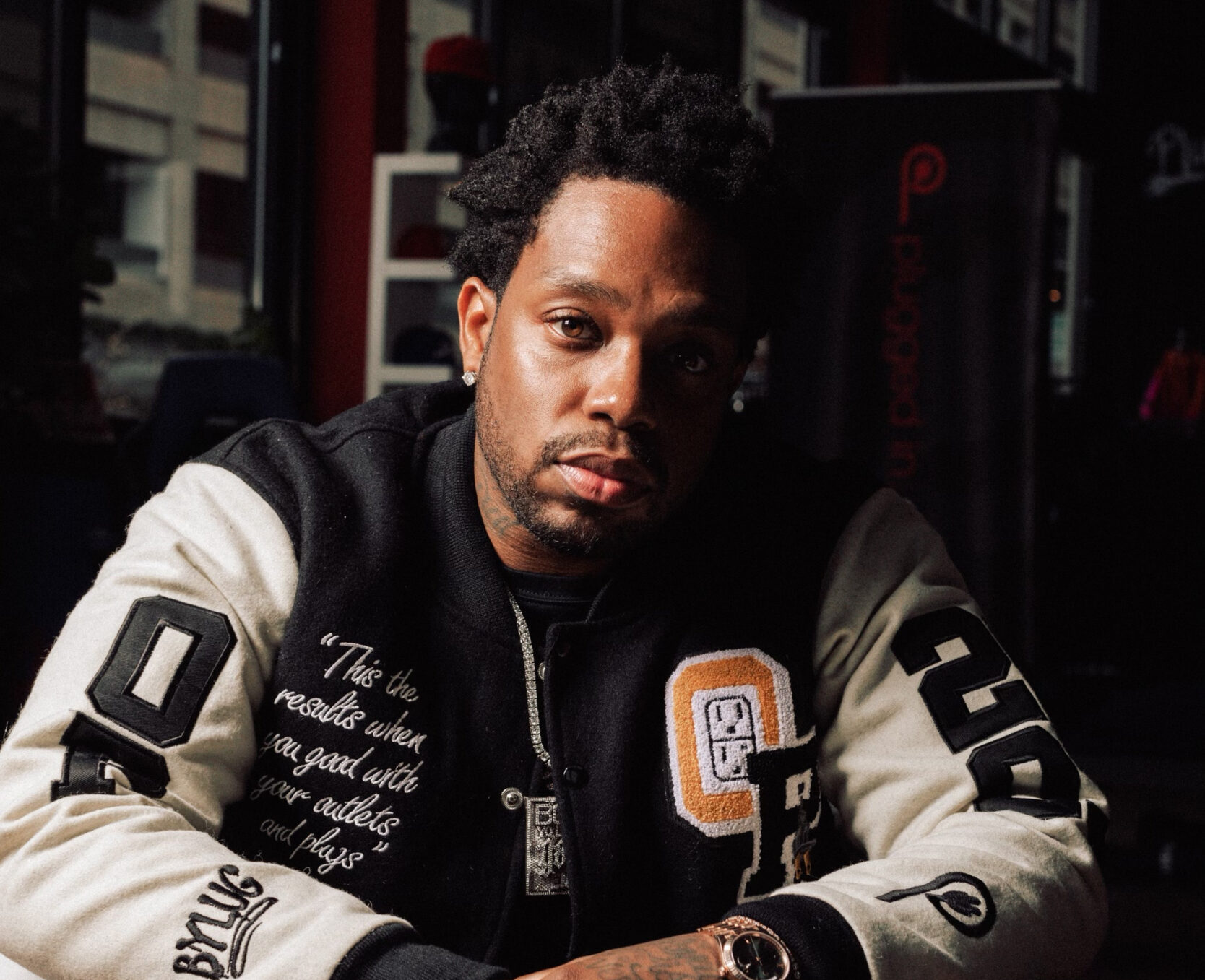Blue Chips is a monthly rap column that highlights exceptional rising rappers. To read previous columns, click here.
There’s a universe where Payroll Giovanni, YG, and Jeezy release a group album scored by the Grammy-winning Cardo (Drake, Kendrick, Curren$y) and a dream team of legendary West Coast producers (i.e., DJ Quik, Daz Dillinger, and Warren G). Unfortunately, we don’t live there. Instead, in this perennially cursed timeline, the songs have remained dormant on a hard drive since the mid-2010s. Payroll Giovanni thinks Jeezy has the hard drive, but he’s never been dismayed that the album hasn’t materialized.
“It just never came out. We were supposed to mix it in Malibu, but that never happened,” Giovanni says nonchalantly on a recent March evening, speaking over the phone while parked in the driveway of his suburban Michigan home. “I don’t be tripping. Everything happens for a reason.”
Platitudes can mask deep wounds, but the 35-year-old Detroit native never seems hurt or embittered. Instead, he’s never let a perceived setback stall his career. In the decade since breaking out as the star of Detroit street rap group Doughboyz Cashout, Giovanni’s become one of the most consistent and respected independent rappers in Detroit. Each project, like late February’s Ghost Mode, racks up millions of streams. He’s also released four of the best West Coast-flavored rap albums in recent memory with Cardo, albums like the Def Jam-backed Big Bossin’, Vol. 2 that work within an aesthetic while re-defining its boundaries. Those Cardo-assisted records pair Giovani’s tales of felonious hustles and high-end purchases with Cardo’s contemporary and more serene take on Bay Area Mobb music, beats made for yachts gliding past white-sand coastlines and backlit by pastel sunsets.
Though seldom mentioned alongside recently ascendant Michigan rappers like Babyface Ray, Babytron, and Kash Doll, Giovanni deserves acclaim for paving the way for that generation while bridging a generational divide. Few regional compatriots would sound as natural as Giovanni does rapping next to early aughts Detroit rap legend Blade Icewood (“Too Late”) and Kash Doll (“Huddle Wit Bosses”).
“I don’t feel defeated and uninspired when I don’t get [recognition],” Giovanni says. “I just focus on what I’m doing and building my lane. ‘What can I do to make my situation bigger?’ If I get acknowledged, cool. If I don’t, oh well.”
Today, the father of two lives by the simple yet arguably enlightened “everything happens for a reason” philosophy. He spends his days hitting the gym, recording, plotting his next business venture, and relaxing with his fiancé. He also helps his 12-year-old son, Juju Da Boss, pursue his rap dreams.
“I’m his CEO/manager/assistant/everything,” Giovanni explains as he chuckles. “He’s been around it since he was born, so it’s just second nature to him.”
The same can be said of Giovanni, who raps with a conversational ease that’s either confident and casual or forceful and motivational, whichever the beat demands. He’s equally at home rapping over smooth, synth-bass slaps (usually provided by Cardo) or uptempo, maximalist Detroit beats. The production usually dictates whether Giovanni poses as the mob boss reclining in a silk robe or offers inspiration as an exacting life coach for aspiring hustlers.
Giovanni splits the difference between those two inextricable halves of his on-record persona on Ghost Mode. Vivid dope boy memoirs come with catalogs of the Don-like luxuries you can buy with a safe full of illicit funds. But Giovanni counterbalances the weight and six-figure watches by counseling against spending beyond your means and advocating for long-term investments. Whether you’re a hustler or a budding entrepreneur, many songs serve as a guidebook for achievement.
“Ghost mode means disappearing off the scene,” Giovanni explains, “cutting off distractions and whatever’s not growing you and locking in on your goals.”
Money has been Giovanni’s main goal since childhood in the Fenkell section of Detroit. No one under capitalism is immune, but he found additional inspiration to earn at home. Descended from two generations of Detroit hustlers, Giovanni likens his family to the Barksdales on The Wire, the founders/owners of a profitable hand-to-hand pharmaceutical company. Dad bumped Bay Area rappers like B-Legit, E-40, and Spice 1 while the flame on the stove burned and Scarface screened on a loop. Giovanni saw and received all the material privileges his father’s work afforded. He also watched everything — stereo, stove, and TV — cut off when the cops kicked in the door.
“I knew more of the ugly side than the pretty side [of hustling],” says Giovanni, who soundtracked his childhood with everything from Cash Money Records to Detroit groups like Street Lordz. “I’ve been in raids when our doors got kicked in out of the blue, our shit getting taken. I knew it wasn’t a game. I grew up wanting to do something different, but I just had to be real with myself. I was already positioned for a certain lifestyle.”
Giovanni rapped in high school with friends who would later form Doughboyz Cashout, but he spent most of his years as an upperclassman graduating from small-time hustles to major weight. He didn’t have to look far for a business partner, linking up with his late grandfather. Though he came from a Barksdale family, Giovanni always had Stringer Bell’s goal of owning real estate.
“Maybe it’s because my dad watched Scarface so much, but the ultimate success in my mind is attached to owning some big-ass buildings in Miami,” Giovanni says.
In the early aughts, Giovanni and Doughboyz Cashout became staples at Detroit parties with local street hits like “Good Ass Day” and “Mob Life.” Giovanni says the group was like “the local Beatles” at the time. By 2013, Jeezy caught wind of Doughboyz Cashout mania and signed the group to his Atlantic-backed label CTE World. Doughboyz Cashout received their signing bonus and dropped a mixtape, but an album never came together. Payroll took the loss in stride.
“Was it a letdown? Not for me,” he says. “I was like, ‘Now we met bigger people and got relationships with people in the industry. Now we can take this shit even bigger.’”
The bump in Giovanni’s stature prevented him from returning to hustling, so he continued to rap about his former occupation on his debut Get Money Stay Humble and 2015’s Stack Season. The content remained the same when he linked with Cardo for Big Bossin, Vol. 1, but the West Coast-leaning sound brought Payroll an audience outside of Detroit.
Giovanni’s continued cultivating that audience with more Cardo records like 2021’s Another Day Another Dollar. But he still satisfies his Midwest fans with solo albums like Ghost Mode. While the subject matter hasn’t changed throughout his career, Giovanni attributes his sustained success to the hard-earned wisdom he imparts on every project.
“My fanbase gravitates to my music because I give them game, something learn and walk away with and apply to their life no matter what they’re into,” he says, shortly before mentioning the prospect of another album with Cardo. “You’re going to listen to that type of shit forever.”




